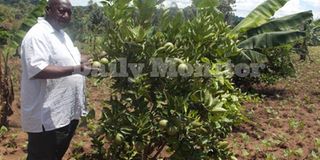‘I always expect a bumper harvest’

Sendi shows some of the oranges he grows on his farm by grafting. PHOTO BY MICHAEL J. SSALI
For Richard Ssendi Walakira of Busagala Village in Kabonera Sub-county, Masaka District, farming must be focussed on the returns that the farmer expects to get. “The crop or animal must be high yielding and it should be the right breed,” he says.
He explains: “It is the reason I grow grafted oranges. I have to choose the right scion and unite it with the right stem to get the seedling that I desire. I planted an ordinary orange tree seedling here on my farm and I have had to wait an entire five years to harvest oranges from it. It is a tall tree and it is difficult to pick the oranges from it. Another disadvantage is that the oranges from the tree do not taste as sweet as the grafted ones, which I planted only about a year and half ago and I am already harvesting oranges.”
He supplies the oranges to supermarkets and he says the customers often look forward to getting the same type of oranges as they bought the previous time.
Therefore, with grafted oranges he is in a position to produce the same type of oranges all the time. “When you plant a seed there is a big chance of failing to get the same type of oranges due to the effects of cross pollination,” Sendi says.
“If you look anywhere on the farm you will notice I only grow cloned Robusta coffee and it is all about getting quick positive results. By planting a coffee seedling prepared from the seed, the farmer may wait up to four or more years before harvesting any coffee.
Yet if the farmer plants cloned coffee seedlings he is sure to harvest in just two or three years. Besides that, the farmer is sure to get identical coffee berries all the time.”
Ssendi, who also grows bananas on 20 acres, is a strong believer in scientific technologies.
He gives a scientific reason for doing whatever he does on his farm. For example, he allocates special space for different banana varieties because those such as mbwa zirume, nakitembe or kibuzi do better when they are grown separately. “For that reason even nakabululu, which many think cannot give large bunches, does produce heavy bunches if grown separately,” he says.
The banana plantation is sub-divided into an acre or two, each one to a particular variety. There is no trace of the much dreaded Banana Bacterial Wilt (BBW). “It is a disease I have fought and completely defeated,” he said. “The trick is simple. Nobody comes to my farm with his or her own tools. Here I keep all my knives, pangas, hoes, and whatever sharp objects that may be used as tools. If anybody wants banana leaves from my farm he or she has to ask me to provide him with the knife to cut them.”
All sharp objects used on his farm must never be used anywhere else.
Exemplary farmers
An Old Boy of St Mary’s College Kisubi, Ssendi, 60, is viewed as an exemplary farmer in the area. He has often been associated with Naads programs, teaching fellow farmers about good farming techniques.
To fight BBW, he has set his own rules at his farm. Wherever his workers go in the banana plantation they carry a container of Jik, a household disinfectant used to kill the BBW virus, and another chemical (whose name he did not reveal) which is used to kill banana weevils.
He harvests bananas every fortnight and immediately after cutting down a banana tree, each worker must dip the panga or the knife used into a plastic container of Jik before using it to cut down another banana tree.
The worker must also sprinkle the weevil-killing chemical over the open cutting at the base of the banana stock before covering it up with sliced pieces of the banana stem.
“After a day or two, any banana weevils that may have been at the bottom of the banana stem will be attracted to the liquid oozing out of it and get killed by the chemical.” He showed this writer some of dead weevils.
His plantation is well mulched with mainly banana leaves and dry maize stems. He also uses poultry litter and cow dung for manure since he is both a poultry and cattle keeper.
Sendi will not easily disclose how many heads of cattle he keeps but it was clear that they are all exotic breeds. “But every so often I have to go to the coffee milling plants and buy coffee husks, which I also apply as manure in the banana plantation.”
To diversify income from his farm, he also grows tomatoes in some parts of his banana plantation. Three or four acres of the banana plantation are intercropped with tomatoes.
The farmer also has 15 acres of his farm devoted to sweet potato. “To maximise profits from sweet potatoes, it is necessary to make large heaps of soil and to apply fertiliser. I use DAP or NPK fertilizer to come up with the desired large tubers which my customers want.”
He sells the sweet potatoes to schools and uses the sweet potato vines as feed for the cows. “Sweet potato vines are very nutritive fodder for cattle,” he explains.
In addition, Sendi encourages all farmers to plant cassava along the boundaries. He has plenty of cassava growing not only along the boundaries of his wide farm but all along the gutters he has dug across the farm to trap water.
The farmer also grows maize, beans and passion fruits. About 65 acres are under crops and the rest of the land is used for cattle grazing.




